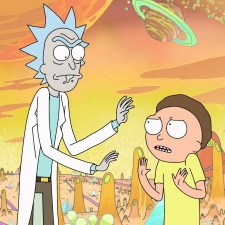 The Pain of Rick
The Pain of Rick
In the television series Rick and Morty, there have been a few episodes that indicates that despite Rick’s obvious persona, he is a deeply unhappy man. First, of course, there is the fact that he’s a drunk. But more important, in the episode “Ricksy Business,” Birdperson explains what Rick’s catchphrase “Wubalubadubdub!” means. He says, “In my people’s tongue, it means, ‘I am in great pain. Please help me.'” (Note: the producers will regret killing off Birdperson, who is one of the best characters created in the show.) But this is not when we see Rick at his worst.
Rick and Unity
In the episode “Auto Erotic Assimilation,” Rick is reunited with Unity, a collective hivemind, who he used to date. At the end of the episode, Unity leaves him, and Rick returns home, dejected. But when asked what happened, he says, “Honestly, we’re talking about an entity that thrives on enslavement, you know? Not cool. Fun’s fun. But who needs it.” And then he walks into the garage and does something very odd — something that Schopenhauer would have done if he had made cartoons.
Rick creates (or reanimates) a creatures that is clearly in great pain. He pets the creature lovingly. And then he puts the creature in between two beams that disintegrate it. It is clearly an act of kindness. Then Rick changes some kind of power supply, and sticks his head between the beams. But before they can fire, he passes out, thus surviving.
The Ethics of Rick and Morty
That is undoubtedly the most shocking moment in all of Rick and Morty. But it’s probably key to Rick’s likability. Morty has a child’s understanding of morality. Rick’s idea is much more sophisticated. That’s especially on display in the episode “Mortynight Run.” In it, Morty is angry with Rick for selling a gun to an assassin. Rick’s thinking on the matter is that the assassin will get a gun whether it is from Rick or not.
Morty says, “Selling a gun to a hit-man is the same as pulling the trigger.” Rick responds, “It’s also the same as doing nothing. If Krombopulos Michael wants someone dead, there’s not a lot that anyone can do to stop him.” And it turns out that Morty’s attempt to stop the hit ended in killing Krombopulos Michael and dozens of other people. What’s more, it turned out that Fart (the gaseous target) was going to kill all organic lifeforms in our universe. So Morty is forced to kill it anyway.
On Being Whores
This relates to my blunt admission that I’m a whore. It’s not that I, like all people, don’t have my own ethics. But I’ll do pretty much anything if the price is right. And the reason for this is that I’ve learned that it is the system that is screwed up. I have friends who work for do-gooder non-profits, and they feel as much like whores as I do. In fact, it is usually worse for them because they feel like hypocrites too. Most of the work of non-profits is to sustain themselves.
So Rick is right. And being right makes him hate himself. As I wrote before (see below), it is Rick and not Morty who hides his true self from the world. All his antics are in the service of hiding that. And Unity dumping him affects him in a more profound way that usual, because like a teenager, even Rick thinks that love can save him. And when he’s reminded that it can’t, he impulsively reaches for the logic of suicide. In a meaningless universe, you either pretend that it has meaning or your exit stage left. When Rick tries to kill himself, he is being the most authentic that he ever is.
Update
I just saw the first episode of season 3 and I see that they brought back Birdperson. Kind of. And the friend of Summer who was going to marry him is alive. I thought she was killed. But I guess not.
Rick and Morty and Me
Some time ago, I was watching an episode of The Simpsons. And in the opening “couch” section, a spaceship crashes into their house, killing the family. And out pop these two characters named Rick and Morty who I had never seen before. Thus was I introduced to Rick and Morty. It looked to me like the kind of show I would love. I mentioned it to Andrea and she pooh-poohed it, saying it was coarse and vulgar. Well, I’ll put up with a lot of coarse and vulgar for brief moments of brilliance. Still, it took until this weekend for me to watch an episode. I ended up watching the entire two seasons.
First, an example. In the episode “The Ricks Must be Crazy,” the spaceship won’t start. Rick and Morty get out of the ship and Rick pops the hood. Morty says, “Is it the quantum carburetor or something?” Rick is disdainful, “Quantum carburetor? Jesus, Morty, you can’t just add a sci-fi word to a car word and hope it means something… Huh. Looks like something’s wrong with the micro-universe battery.” Yes, I know: I’m a sucker for this kind of meta-humor. But that’s a solid joke no matter how you look at it.
The Most Cynical Show
While watching the shows this weekend, I was struck by the fact that Rick and Morty was about the most cynical television show I’d ever seen. And it amazed me that Andrea said she didn’t like it. So I asked her again, and she too had gotten drawn into it thanks to her husband, and now appreciates it. (Clearly, she could do with fewer of the sexual references and the ridiculous amount of gore.) That made me feel as though all was right in the universe. Too much of it is typical of her sense of humor. This may also explain why I’m one of her few remaining friends. (Oh, I kid! Sorta.)
I think much of the appeal of the show to its target audience (basically me, but skewing younger) is that we all wish (at least superficially) we were Rick but always feel like Morty. (Excluding the evil Morty with the eye-patch who we met in “Close Rick-Counters of the Rick Kind.”) Rick is, after all, the cool kid in high school. Indeed, he becomes so explicitly in “Big Trouble in Little Sanchez.” But I’ve seen it a lot during those unfortunate times when I’ve been on the bus when the high school lets out. Almost everyone in high school wants to be Rick (not caring about anyone else) and lives in terror of being seen for the Morty who they are.
The Essence of Rick
You’ll note that I said “almost.” Rick is, as far as any likable character can be, a psychopath. The show does an excellent job of showing just enough of Rick’s inner life to see that ultimately he is Morty — just older and wiser. In “A Rickle in Time” he proves, mathematically, that, “As far as grampa is concerned, you’re [Morty and Summer] both pieces of shit.” But as a viewer, I’m unconvinced. I’m just impressed with any character who would be willing to say such a thing. And it is, after all, in the service of saving their lives.
Maybe We Have Rick and Morty Backward
But if Rick is really just Morty with a great con, then isn’t he the one who is really insecure. Morty just is who he is. Sure, perhaps this is just a function of his youth and stupidity. But he is authentic in a way that Rick clearly is not. So in the end, I’m ashamed to want to be Rick. Because the truth is: I am Rick — just not a very successful one. And I’ve long ago reached a point where I value authenticity above any of my childhood dreams.
What’s most interesting about Rick and Morty is that the series seems to understand this. It knows that all of Rick’s brilliance is ultimately impotent. Why has he come to live with his daughter? Because he knows he’s a fraud. He’s seeking meaning. But like the rest of us, he’s lost. It’s like in the episode, “Something Ricked This Way Comes.” Rick creates a robot to pass the butter. When it finds out that its purpose, it reacts as any of us would. Although I have to say: that’s more of a meaning that I think my life actually represents. And I’m not just saying that because Rick would. I’m in my fifties. Some insights are inevitable.

 Perhaps you’ve heard it said that Donald Trump is all about ego, not ideology. The reason many conservatives were so slow to warm up to him, on this view, is that they realized he’s not really one of them. He is driven not by any political or philosophical principle but by his desperate need for attention and approval. Thus, as one columnist suggested hopefully after the election, he may “tilt in whatever direction, and toward whichever constituency, is the surest source of applause.”
Perhaps you’ve heard it said that Donald Trump is all about ego, not ideology. The reason many conservatives were so slow to warm up to him, on this view, is that they realized he’s not really one of them. He is driven not by any political or philosophical principle but by his desperate need for attention and approval. Thus, as one columnist suggested hopefully after the election, he may “tilt in whatever direction, and toward whichever constituency, is the surest source of applause.”